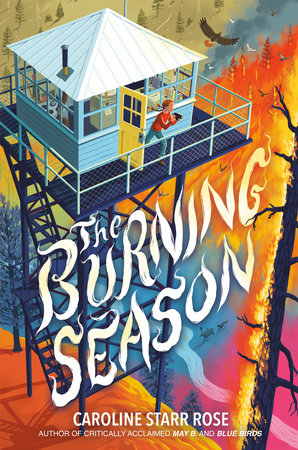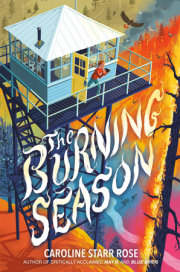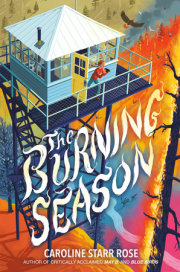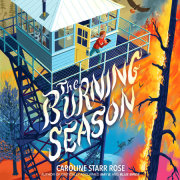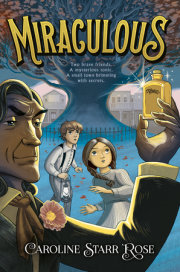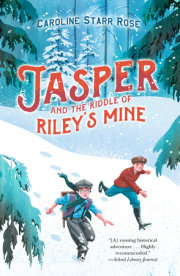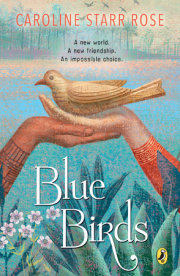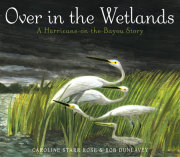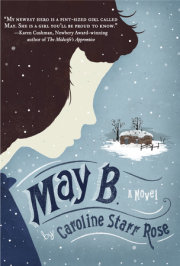LIGHTNING CUTS
across the sky.
The lantern casts
strange shadows.
Thunder booms
close enough
I feel its echo
in my chest.
Wind whips,
rattling dishes.
Cups clink
in their crate.
I press my hand
to the windowpane.
The glass is ice,
the air not much warmer
up here, in a box
with metal legs
perched on the edge
of a mountainside.
Lightning burns,
thunder follows,
no distance in between.
I mark the glass on the Firefinder,
but bolts of light come so fast
the Xs I make
are only a few
of all the strikes I’ve seen.
The tower’s grounded with copper wire
running straight to bedrock.
If lightning strikes, its current is carried
deep underground.
A fire tower’s the safest place
a person could be in a storm.
But the potbellied stove might be dangerous.
Smoke’s made of carbon, Gran says.
It transmits electricity.
She told me a story where a lightning bolt
once zipped through a stovepipe, burning a lookout.
I fill a cup, pour it over the coals.
Steam fills the air, a puff of ash.
In Aunt Dor’s day, a tower was struck
in the Mangas Mountains, killing a lookout.
And even with the grounding wires,
Barb, on Black Mountain, a few years back
had shoes blown off her feet!
I grab the stool stored under the sink.
We call it our lightning chair.
It’s a simple square with glass insulators,
like little jam jars, covering its legs.
There’s not enough room for three to sit,
but there’s enough—barely—
for three to stand.
I think of Mom and Gran and me,
huddled together, holding each other,
while I’m here alone.
STRIKE
Lightning burns
thunder explodes
electricity prickles
over my arms
a blinding flash
a deafening blast!
like the world’s
being torn
to pieces
PRAYER
Please God
please God
keep Gran safe
hold her close
God please
STATIC FROM THE RADIO
Mark or Jim checking in.
Maybe Mark has news of Gran.
But thunder masks the choppy words.
The radio’s signal is weak.
I lift the receiver.
“Silver City? Please repeat.
Are you there, Signal Peak?”
No click
no static
only emptiness.
THE MORNING IS BEAUTIFUL
quiet and calm,
as it always is after a storm.
A hint of sun warms the east.
Nearby, a pinyon jay sings.
The cab is freezing.
I wrap Gran’s quilt around my shoulders.
Somehow deep in the night
I finally fell asleep.
I reach for the radio again,
press the button to make a call.
But no static crackles.
There’s no sound at all.
The jay goes on singing.
BATTERIESI dig through the crates
and Mom’s desk drawers
the magazine basket
the kitchen cupboards
frantically searching,
wildly hoping
the last
aren’t
in the radio.
In the shed I find
Gran’s firepack
from the olden days.
I open the pouches
pull everything out
sifting, sorting,
hoping, hoping.
In a zippered pocket
next to a flashlight
and old battered canteen—
There. A set of batteries.
I grab them and ones
from the flashlight too,
then rush upstairs,
testing them all,
trying and trying
the radio.
WHAT'S BESTI take a deep breath,
let it out slowly.
The batteries failed.
The radio’s dead.
I can’t send word to Silver City,
can’t tell Mark that Gran’s still not back.
By now Mark’s talked to the Salazars.
Jeanette could be hiking over right now,
leaving Bear Wallow to help find Gran.
Mark will know when I don’t sign in
something’s wrong here too.
That flare I saw, the flash of light—
I know better than anyone
the spot where Gran might be.
She must be deeper in the woods
beyond the old burn scar.
I’m the one who has to find her.
PREPARATIONSThe firepack from olden days
I take from the storage shed.
Bigger than my hiking pack,
there are things inside that might be useful:
a collapsible shovel,
a dented canteen,
an old compass that’s broken and cracked,
a box of matches, a first aid kit,
a map of the Gila Wilderness.
A Pulaski handle sticks from the bag,
part axe, part hoe, a double tool
fire crews use to build a line—
to clear vegetation down to the soil
to keep a fire from spreading.
Upstairs again, I make my plan.
I’ll check the woods a second time,
then work my way out from there.
If the flash of light was really Gran,
if she was able to get to shelter,
she’s probably on the side of Wolf Ridge
where the fire burned years ago.
The thought of it ignites my fears.
If I hadn’t stopped searching yesterday,
she wouldn’t have spent a night in the storm.
A quick sponge bath at the sink,
I brush my teeth and braid my hair,
pull on a faded pair of jeans,
a red sweatshirt,
my hiking boots,
reach for the coat
that’s grown too small,
a turquoise baseball cap.
I scoop beans into a mason jar,
fill the canteen and a water bottle,
grab the mini water filter,
apples and granola bars,
roll up my mat and sleeping bag
and strap them to the pack.
I unhook our mirror from where it hangs
on a string near the door.
It’s about the size of my science book.
There.
That’s everything.
LOVE, OPAL
I can’t leave without a note.
What if Jeanette comes while I’m gone?
The radio’s dead.I’ve got to find Gran.I think she tried to signal mefrom the woods on the other side of the rivernear the Wolf Ridge scar.If you find her first, tell her I love her.
My throat aches with tears.
I grab my pack.
I scan the cab one last time,
the solar-powered lantern still burning
in case Gran comes,
beats me back.
OUTSIDE ON THE CATWALKI grip the mirror’s sides
and face the mountains
miles from here—
the faraway Mangas,
their friend Eagle Peak,
Signal’s curved dome,
Black Mountain’s smooth back,
where others live
in towers like
mine.
Back in the day
lookouts used mirrors,
sent flashes tower to tower.
The morning is new. The sun still low.
I tilt the mirror to catch the light
and move it side to side.
Up and down I shift the glass,
unsure if I’m doing it right.
I face northwest, where Bear Wallow is,
then Eagle due north, and Black northeast.
Last, I try Signal Peak.
Others must have heard last night
when I talked to Mark on the radio.
Now maybe they’ll see these flashes of light—
maybe Gran will see them too—
my message she’s missing,
that I’m coming soon.
Copyright © 2025 by Caroline Starr Rose. All rights reserved. No part of this excerpt may be reproduced or reprinted without permission in writing from the publisher.

